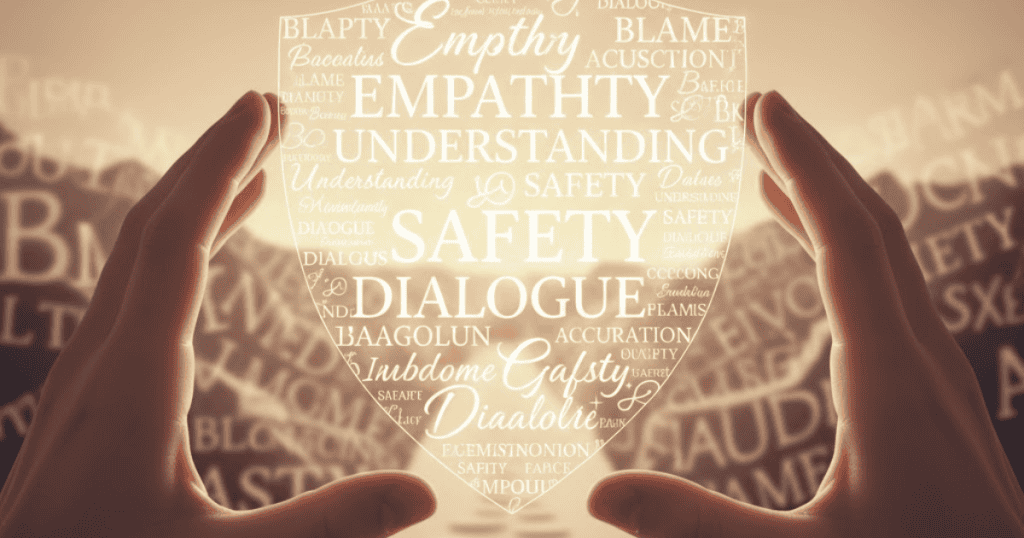It always starts the same way.
Someone tilts their head and asks gently, “But what did they actually do?”
And I freeze. Because how do I explain that the worst part wasn’t a slap, a scream, or a scene, but the slow erosion of reality itself?
How do you tell someone that what broke you were things that sounded ordinary when spoken aloud?
The sigh before you spoke, the rolling eyes, the weeks of silence, the tone that turned kindness into a trap.
Emotional and psychological abuse doesn’t translate well into words. It’s felt, not seen.
It’s a language of pauses, patterns, and pressure, of living in constant analysis mode so you can survive the next shift in mood.
And that confusion, the gap between what happened and how it sounds, is part of the design.
Narcissists craft chaos that collapses under retelling.
It’s engineered to sound unbelievable or “not that bad.”
This is why survivors struggle to explain.
Below, I’ll unpack why it’s so hard to find words for what happened and what unfolds when we try.
Most importantly, I’ll share how to reclaim your voice even when the world doesn’t understand.
Table of Contents
Why Narcissistic Abuse Defies Language?

Narcissistic abuse doesn’t bruise your skin. It bruises your perception.
It attacks the filter through which you experience reality, leaving scars no one else can see.
There was one morning at home when my toxic brother “forgot” to do something again, and I pointed it out.
He smiled, then twisted my words. “You’re too sensitive. Why do you always overreact?”
The moment was ordinary, but the aftermath wasn’t.
I found myself replaying the entire conversation later, doubting my tone, my memory, even my right to feel upset.
That’s gaslighting, turning certainty into fog until you can’t tell what’s real.
When I finally tried explaining it to someone outside the family, I heard myself stumble.
“Well… he didn’t yell. It’s just… the way he said it,” I said.
I sounded uncertain because the abuse was built to make me sound that way.
Survivors aren’t confused. The confusion is the product.
It’s deliberate, a psychological smokescreen designed to make the truth sound unreliable.
The Trap of “It Doesn’t Sound That Bad”

Our culture understands bruises, not brainwashing.
When abuse leaves no visible mark, it’s dismissed as “drama.”
Society minimizes manipulation because it doesn’t show up on MRI scans or in police reports.
I once tried to describe what life with my controlling mom felt like.
“She just… doesn’t like when I do things my way,” I said carefully.
The listener shrugged. “That’s just moms being moms.”
But they didn’t see the aftermath.
The silent weeks where she pretended I didn’t exist, or how she rewrote entire events to make me apologize for things I never did.
Narcissistic parents are masters at weaponizing love itself: “I’m only hard on you because I care.”
And because narcissists are often charismatic in public, they distort credibility.
They sound calm and reasonable, while the survivor sounds emotional, reactive, “too much.”
That public charm became my mother’s armor.
At family gatherings, she’d smile sweetly, correcting my version of events with a laugh, “You know how dramatic she is.”
Everyone nodded. I laughed too, because arguing would only prove her right.
When disbelief meets your truth, it reactivates the same invalidation you escaped.
You begin to doubt your pain, and once again, their control continues, even in their absence.
The Self-Silencing Reflex

There comes a point when explaining feels like walking barefoot on glass.
I learned to stop mid-sentence, censor myself, and edit my truth before it left my mouth.
Not because I was weak, but because I’d learned that words don’t land.
I remember sitting in a car with my toxic sister after another argument with our mother.
I tried to tell her what happened, how the conversation turned into an accusation I didn’t see coming.
She sighed. “You know how she gets. Just let it go.”
The message was clear: my pain was inconvenient. My silence was peacekeeping.
Over time, my nervous system started associating “talking” with “danger.”
Every time I tried to explain, my body went into fight-or-flight. Heart racing, throat closing, palms sweating. So I stopped.
Silence became safety. Not peace, but survival.
Why the Narcissist Sounds More Convincing?

Calm vs. Chaotic Energy
When narcissistic abusers tell their version, it’s rehearsed.
They’ve practiced their narrative a hundred times before you’ve even found words for yours.
They deliver it smoothly, with confidence, like a news anchor reporting facts.
Meanwhile, survivors of narcissistic abuse speak while still shaking. Our sentences scatter, emotion leaks through.
We look unstable because we are unstable. The abuse destabilized us by design.
I once confronted my self-absorbed brother privately about how he’d mocked me in front of others.
He stayed calm, smiling faintly. “You’re reading too much into it,” he said, voice steady.
I, on the other hand, was trembling, tears forming.
Guess who looked “crazy?”
People equate composure with truth. They mistake emotional regulation for credibility.
This unconscious bias protects narcissists and isolates survivors.
The DARVO Playbook
Every narcissist seems to have read the same manual: DARVO. Deny, Attack, Reverse Victim and Offender.
My aunt used it like clockwork.
The day I called her out for belittling my cousin, she denied everything, “I was only joking.”
Then came the attack, “You’ve always been so sensitive, just like your mother.”
Finally, the reversal, “I’m the one hurt here. I can’t believe you’d accuse me after all I’ve done for you.”
Within minutes, I was the villain.
The more I defended myself, the guiltier I looked.
DARVO flips truth on its head so that every attempt to expose the abuse becomes “proof” of your instability.
It’s psychological aikido, using your momentum against you.
The Hidden Cost of Being Misunderstood

Every failed attempt to explain deepens the wound.
After years of trying and failing to be believed, I started thinking maybe they were right. Maybe I was the problem.
That’s how shame works. It turns disbelief from others into self-doubt within.
I once opened up to a friend about my sister’s manipulative behavior, and she said, “That doesn’t sound so bad. Maybe she’s just stressed.”
That night, I stared at the ceiling, replaying every word, wondering if I’d exaggerated.
That’s the quiet aftermath no one talks about: self-interrogation disguised as accountability.
Being misunderstood is retraumatizing.
It teaches your nervous system that truth is dangerous and that safety comes from silence.
The abuser doesn’t even need to be there anymore.
Their voice lives rent-free in your head, policing your own story.
How to Find Language That Protects, Not Proves

Healing isn’t about convincing others you were hurt.
It’s about reclaiming the right to name what happened, clearly, calmly, and without apology.
Reclaim the Story for Yourself
I stopped trying to make outsiders understand and started writing for me.
Journaling became my lifeline. No audience, no defense.
When I wrote things down, patterns appeared: gaslighting, triangulation, control, devaluation.
Naming them didn’t erase the pain, but it gave it shape. It turned chaos into clarity.
Therapy helped too, but only when I found a trauma-informed one.
The first therapist told me to “make amends” with my mother. The second said, “Let’s talk about how you learned to doubt yourself.”
That one helped me rebuild trust. Not in others, but in my own mind.
Reclaiming the story isn’t about revenge. It’s about re-anchoring your sense of reality.
Choose Safe Listeners
Not everyone deserves your story. Some people will only poke at it, twist it, or use it as gossip fuel.
I learned this the hard way after confiding in a cousin from my mother’s side.
She nodded sympathetically, then later mentioned everything I said to my aunt, the very person I’d been describing.
The fallout was brutal.
Since then, I choose listeners like I’d choose emergency contacts: those who can hold truth without judgment.
My dad and cousins from my mother’s younger brother’s side became that circle.
They didn’t try to fix me. They just believed me.
And sometimes, that validation heals more than any mental health advice ever could.
Protect your peace like evidence. Store it somewhere safe.
Speak Without Apology
For years, every attempt to tell my story began with, “Maybe I’m crazy, but…”
That sentence alone carried the residue of gaslighting.
Now, I drop the qualifiers. I state facts plainly. No disclaimers. No softening.
I’d say, “She ignored me for two weeks after I disagreed with her,” or “He mocked me in front of others and said it was a joke.”
Speaking without apology isn’t arrogance. It’s reclamation.
It’s the act of stepping out of the fog and saying, “This happened, and I know what I saw.”
You Don’t Owe the World an Explanation

Silence once kept me safe.
But now, I understand that my story still matters, even if no one else ever fully gets it.
Some truths are too complex to fit inside other people’s comprehension.
That doesn’t make them any less true.
So if you’re out there trying to explain your pain and it comes out tangled, incomplete, or “not that bad,” remember that disbelief doesn’t erase what happened.
You don’t need the perfect words to explain it. The fact that you survived it is explanation enough.
Related posts:
- 10 Nonverbal Abuse Tactics Narcissists Use to Control You
- How a Narcissist “Shows” Love (And Why It’s Actually Abuse)
- Why People Judge You After Narcissistic Abuse (And Why Their Opinion Means Nothing)
- 12 Daily Habits That Keep You Sharp and Strong After Narcissistic Abuse
- Collective Narcissism: The Hidden Family System That Shields Abusers


